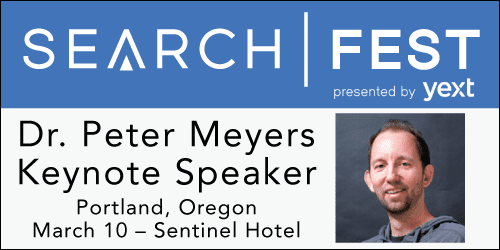Dr. Pete Meyers will give the morning keynote at SearchFest 2016, which is being held March 10th, 2016 at the Sentinel Hotel in Portland, Oregon. For more information or to purchase tickets, please click here.
 1) Please give us your background and tell us what you do for a living.
1) Please give us your background and tell us what you do for a living.
I’m an experimental psychologist by training, but my undergraduate degree was in computer science and I went to work for a start-up after I finished my Ph.D. That was in the mid-90s, and we had the usual delusions of grandeur about where the web would take us. We survived the boom-and-bust, and I learned a lot, even if I’m not a billionaire. Currently, I’m Marketing Scientist for Moz, which is just a non-committal way of saying that I work across the marketing and data science teams (among others). I create data-driven content, mostly related to Google – including the MozCast project – and I do research and prototyping to help Moz understand where our product needs to be in the coming years.
2) What are the top opportunities for Organic Page 1 exposure if you can’t earn one of the “Ten Blue Links”?
It’s tricky to give one answer, because those opportunities are diverging and really depend on the SERP and your niche. For some, it might be News results or In-depth Articles. For others, it might be getting information into the Knowledge Graph and things like Local Knowledge Panels. Honestly, for some SERPs, it’s going to mean admitting that paid results (ads and shopping) dominate. Right now, the most interesting opportunity to me are index-based answers, in the form of Featured Snippets and Related Questions. These aren’t “organic” results in the way SEOs typically mean, but they’re attributed and drive clicks. They represent a new and different frontier for SEO, and I think that frontier is expanding.
3) Do you see a correlation between semantic markup and “jumping the organic queue”?
I don’t see a huge impact of markup. There are definitely cases where proper markup can enhance an organic result (reviews, for example), but Google is looking far and wide for index-based answers, and they seem to be able to extract information even without proper markup. Your code can’t be a hot mess, of course, but Google is extracting data from regular text, tables, bullet lists, etc. Markup can help boost your chances of getting some listings, including In-depth Articles, but markup is typically only one piece of the puzzle.
4) How strong are social signals in Google’s algorithm?
If we’re talking directly – in other words, do more tweets equal better ranking – then I believe they’re still very weak signals. On the other hand, social signals definitely help content get crawled and indexed and more social signals often do drive traffic and links. There are many times social signals correlate with rankings, but I believe the relationship is indirect. One notable exception, of course, is the new in-SERP Twitter results, where tweets appear directly on page one.
5) How does “breaking news” impact the Google algorithm?
It depends a lot on the query, but for queries that are “newsworthy”, I think it has much more impact than it used to. Google is not only getting better at indexing and ranking content quickly, but the “In The News” update last year (which was barely noticed by most SEOs) opened up news results to a much wider variety of sources. SERPs with News results fluctuate a lot more now, and even the presence or absences of a News block can change from day-to-day. It’s more challenging, if you deal with newsworthy content, but it also means that there’s opportunity for a wider range of publishers.
6) For those who don’t follow you closely at Moz, describe the mechanics of “The Weather Report” and its value to SEO’s.
I built and maintain the MozCast project, which attempts to track the Google “weather”. Essentially, we look at how rankings change daily across a fixed set of 10,000 (currently) keywords. This project started as kind of a whim (or, as a nod to Google, let’s call it a 20% project), but it has evolved into a system that tracks Google’s features, UI changes, and a lot of other data. The value to most SEOs, if I had to narrow it down, is that it helps them know they’re not crazy. A big part of our job understanding whether rankings moved because we changed something or because Google changed something. My personal interest is in tracking the feature landscape (elements of the SERP beyond those 10 blue links) and how they change and increase over time, because those are the future SEO opportunities.
Todd Mintz knows PPC…knows Social Media…knows SEO…knows Blogging…knows Domaining…and knows them all real well. He runs growth marketing for )and is also a Director & Founding Member of SEMpdx: Portland, Oregon’s Search Engine Marketing Association, and he can be found here on Twitter and Facebook.
